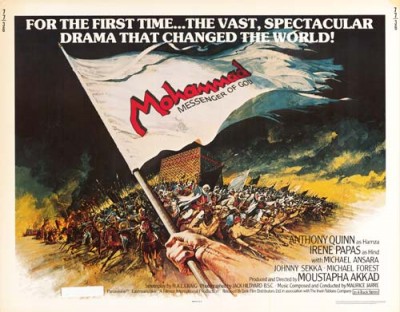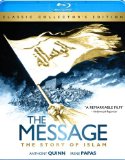| Reviews & Columns |
|
Reviews DVD TV on DVD Blu-ray 4K UHD International DVDs In Theaters Reviews by Studio Video Games Features Collector Series DVDs Easter Egg Database Interviews DVD Talk Radio Feature Articles Columns Anime Talk DVD Savant Horror DVDs The M.O.D. Squad Art House HD Talk Silent DVD
|
DVD Talk Forum |
|
|
| Resources |
|
DVD Price Search Customer Service #'s RCE Info Links |
|
Columns
|
|
|
Message (Mohammad, Messenger of God), The
His death is sadly ironic. The film succeeds in its sincere attempt to dramatize the birth of Islam in a manner accessible to non-Muslims whose religious epics have been limited to movies drawn from the Old Testament and those chronicling the life of Christ. As such the film makes for fascinating viewing, one that's informative, spreading the Message of the title in a manner as positive and uplifting as last week's attack was negative and damaging to the Muslim population.
Anchor Bay's late-2005 DVD release was problematic. The movie was shot in 2.35:1 Panavision but for the DVD was cropped to 1.78:1, thus on widescreen monitors it is essentially panned-and-scanned full frame. There were numerous complaints about this at the time but, nonetheless, Anchor Bay's new Blu-ray version offers that same flawed video transfer. It's seems odd to me that Anchor Bay would go to the trouble and expense of creating new 5.1 DTS HD-Master Audio (the audio was already quite good on the DVD) yet ignore something described as pretty ruinous in nearly all DVD reviews back in 2005 and now even more so in reviews of the Blu-ray version.
Per Islamic custom against dramatic impersonation of any prophet (including both Moses and Jesus), the image and voice of Mohammad is not shown, nor are his many wives and children. This quandary, trying to make a movie about the founding of Islam without ever showing its founder, had been enough to deter earlier efforts by Hollywood producers to tell this story. In The Message, characters talk to Mohammad by speaking directly into the camera, and respond to replies that we the audience cannot hear. This is occasionally awkward but not nearly as calamitous as it sounds, and in some ways even works to create an ethereal, universal portrait. (William Wyler had done something similar in Ben-Hur, in which the face of Christ likewise is never seen.) Moreover, the picture instead focuses mainly on the Prophet's disciples, and the ensemble effect has advantages as well.
The film traces the growing influence of Mohammad in 7th century Arabia after returning to Mecca from a cave where he has received the Word of God. Mecca's leading merchants - including Abu Sofyan (Michael Ansara), Hind (Irene Papas), Otba (Robert Brown), and Abu-Jahal (Martin Benson) - worry that Mohammad's teachings, particularly his declaration that there is but one God, will offend visiting tribes whose false idols number in the hundreds. Mohammad's sympathetic uncle, Abu-Talib (Andre Morell), tries to intervene, but to no avail.
Mohammad's message of peace and brotherhood soon has a steadily growing list of followers, including Mohammed's warrior uncle, Hamza (Anthony Quinn), reformed soldier Khalid (Michael Forest, his voice inexplicably dubbed), freed slave Bilal (Johnny Sekka, in a role coveted by Muhammad Ali) and Mohammad's adopted son, Zaid (Damien Thomas). The leaders of Mecca eventually drive them out of the city, and later send troops to destroy them when their message of equality for all men (and women) threaten the status quo of Arabia.
The Message is fascinating to watch partly because much of the iconography (slaves freed from their oppressive masters, an exodus through the unforgiving desert, etc.) of Christian epics like King of Kings is exactly the same and the settings are likewise familiar. To this end The Message is very accessible, and viewers intimidated by their unfamiliarity with The Koran need not worry. Unlike the Arabs of, say, Lawrence of Arabia, so alien in their customs to T.E. Lawrence, characters here are recognizable movie types while avoiding Arab stereotypes.
Quite unlike the extremism of headline-grabbing fundamentalists, whose violent actions so distort western views of mainstream Islam and inflame a western climate of suspicion hanging over all Muslims, The Message is all about tolerance and equality. According to the film, "Jews and Christians have equal rights with Muslims." Mohammed's message likens Christians and Muslims to "two rays from the same lamp," religions more alike than not, and a scene where Mohammed's followers seek sanctuary with the Christian King of Abyssinia is well done. Whether this is a moderate or leftist view among Muslims today this reviewer cannot say.
Most of the film is competently but conventionally made. Akkad is occasionally inspired, however, such as one evocatively and subtly realized scene where the Prophet is nearly captured hiding in a cave, but saved because of a spider's web covering its entrance. (The trackers assume no one's inside; otherwise the web would have been broken. This is a story common to Christianity and Judaism, as well as folklore.) The triumphant return to Mecca by the refugees has an emotional payoff, and the film's epilogue, with scenes of mosques around the modern world over is impressively done.
Video & Audio
Anchor Bay's Blu-ray of The Message unpardonably crops the 2.35:1 Panavision image to 1.78:1. A few telecined shots are clearly scanned left or right across the image (and a few credits and subtitles are left unsqueezed so that audiences may read them). The end result isn't nearly as extreme as, say, the panning and scanning of early CinemaScope movies for 4:3 televisions, but compositions still suffer. Further, this older transfer suffers more in high-def than did the DVD. Everything looks a tad softer than it should, and the color unflatteringly favors green in some shots. But the DTS-HD Master Audio, derived from original 4-track magnetic recordings, is good with a lot of directional audio. There are no subtitle or alternate audio options. The disc is region "A" encoded.
Extra Features
The DVD version included some good extras, including a 44-minute documentary called The Making of an Epic: Mohammed - Messenger of God, narrated by co-star Damien Thomas, an Audio Commentary track with writer-director Moustapha Akkad, and even the complete 198-minute Arabic version, al-Risalah, without English subtitles but presented in a superior 16:9 enhanced transfer that preserved the original Panavision theatrical aspect ratio of 2.35:1.
None of these extras have been ported over, making this Blu-ray even less attractive over than the earlier DVD release.
Parting Thoughts
As a movie, The Message falls well short of greatness, but it is pretty good and consistently engrossing and informative, and for its accessibility alone deserves a wider audience than it received when it was new. But the Blu-ray is needlessly disappointing, one that doesn't fix a fundamental problem with the earlier DVD while at the same time dropping all that disc's interesting extra features. Skip It and buy the DVD instead.
Stuart Galbraith IV is the Kyoto-based film historian and publisher-editor of World Cinema Paradise. His credits include film history books, DVD and Blu-ray audio commentaries and special features.
|
| Popular Reviews |
| Sponsored Links |
|
|
| Sponsored Links |
|
|
| Release List | Reviews | Shop | Newsletter | Forum | DVD Giveaways | Blu-Ray | Advertise |
|
Copyright 2024 DVDTalk.com All Rights Reserved. Legal Info, Privacy Policy, Terms of Use,
Manage Preferences,
Your Privacy Choices | |||||||
















